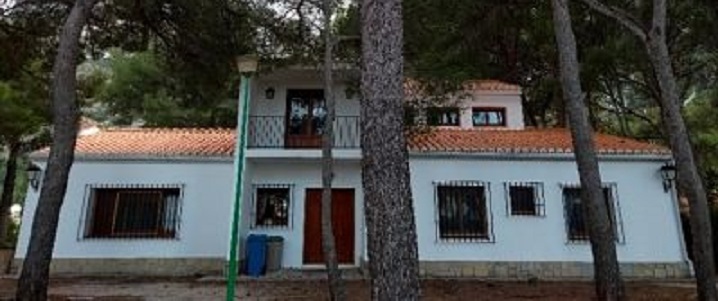|
Marine Laboratory of the Univ. of Alicante in Dénia
(MarLabUA-Dénia)
|

|
|
Type of Research Institution
|
| | Intergovernmental | |  | Academic | | | Governmental, national | | | Private | | | Governmental, local | | | Charity / Foundation |
|
|
|
Address : Ctra de la colonia nº21
03700 Dénia
Alicante Alicante
SPAIN |
|
Phone :
+34 652995524
|
|
|
|
Director :
Dr Cesar Bordehore
|
|
Contact person :
|
|
|
|
|
Number of permanent staff
|
| | Scientists (with doctorate/ PhD) : 4 | | | others : 10 |
|
|
|
Type of Activities
|
|  | Pure research | |  | Academic | |  | Applied research | |  | Education / Outreach | |  | Long-term monitoring | |  | Policy / Planning / Consultancy | |  | Technology for environmental applications | |  | Conservation & Protection |
|
|
|
Main fields of research (at present - 6 max)
|
| population modeling and dynamic systems and biomathematics; marine ecology; biology and ecology of gelatinous organisms (mainly jellyfish and cubozoans); environmental monitoring (physicochemical and biological parameters, non-indigenous species and emergent pollutants such as microplastics); marine habitats (characterisation and cartography); fisheries management, modelling and marine protected areas
|
|
|
|
Main research collaborations at international level (at present)
|
| * University of Southern, Denmark; University of British Columbia, Canada; University of Minho, Portugal; Sao Paulo State University, Brazil; James Cook University, Australia.
|
|
|
|
Ongoing long-term monitoring programs
|
| * Oliva-Dénia-Jávea coastal monitoring (FQ and biological parameters). |
|
|
|
Total area dedicated to research (m2)
|
|
|
|
|
Conference room
|
| no |  | yes (number of seats : 25 ) |
|
|
|
Research vessel(s)
|
 | less than 12 m in length; number of vessels : 3 | | more than 12 m in length; number of vessels : 0 | | Brief description of vessels and on board scientific equipment :
Semi-rigid boat (6 m) with a 115HP outboard motor. 8 pax.
Trimaran (8m) with a 250HP outboard motor. 12 pax.
Sailboat (9.5m) with a 50 HP inboard motor. 5 pax.
|
|
|
|
Other major research facilities and equipment
|
* Equipment: Drifting buoys MetOcean (6 pcs), DeepVision side scan sonar, Advantech magnetic current meters (2 pcs), Advantech CTD multiparameter logger (2 pcs), CTD Seabird multiparameter logger, fluorometer for phytopkankton identification from Chelsea Technologies, Optical carbon dioxide sensor, Advantech sensors (light intensity sensor and hydrocarbon), HOBO sensors (pH and temperature), Hanna portable photometer and redox sensor, Eutech portable salinometer, KC Denmark and General Oceanics flowmeters. Van Veen dredge, planktonic nets (20, 200 and 400 µm and 4 mm), Niskin bottle, Secchi disk, Garmin 72H GPS, underwater cameras, diving equipment.
*
Wet laboratory with different size aquaria and their respective equipment (filters, pumps, diffusers, heaters, etc.). Dry laboratory with extraction hood, oven, muffle, table shaker, filtration systems, plankton splitter, sedimentation column, precision balance, cold sample storage area. Microscopy room with 3 stereomicroscopes, 1 optical microscope and 1 inverted microscope.
|
|
|
|
Ecosystem types available nearby
|
 | Direct access to sea | | No direct access to brackish / estuarine waters | |
Other ecosystems : Posidonia oceanica and Cymodocea nodosa meadows, rocky and sandy coast. |
|
|
|
Areas of taxonomic expertise
|
|
|
|
|
Specimen collections
|
 | yes | | no | |
Brief description : Carybdea marsupialis (Cubozoa) |
|
|
|
Hosting facilities for visiting scientists
|
 | yes | | no |
|
|
|
Training courses
|
 | yes | | no | |
Modelling ecological systems. Introduction.30h.
Modelling ecological systems. Advanced. 30h.
Yes we can: maximizing fisheries profits, captures and fish stocks
|
|
|
|
Capacity and brief description of library
|
| About 150 books. Main subjects: marine invertebrate, algae and fishes guides, marine ecology, plankton ecology, coastal management, dynamic modelling, environmental toxicology, marine spatial planning, marine chemistry, marine conservation. |
|
|
 CIESM GUIDE OF COASTAL INSTITUTES IN THE MEDITERRANEAN AND ADJACENT SEAS CIESM GUIDE OF COASTAL INSTITUTES IN THE MEDITERRANEAN AND ADJACENT SEAS
Last update : 2024
|

 CIESM GUIDE OF COASTAL INSTITUTES IN THE MEDITERRANEAN AND ADJACENT SEAS
CIESM GUIDE OF COASTAL INSTITUTES IN THE MEDITERRANEAN AND ADJACENT SEAS



